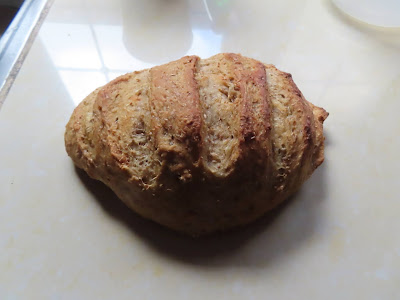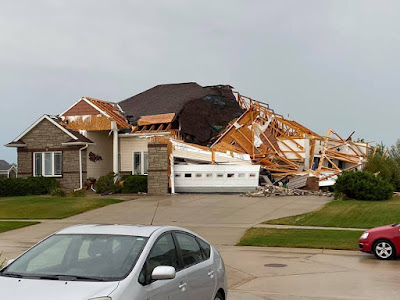On the morning of January 28, at 7:05 am, I got a phone call from a communion minister in a nearby village. He greeted me on the feast of St. Thomas Aquinas and expressed his gratitude for STA’s support of the parish. He was going to the exposition of the Blessed Sacrament in the church in his village (which they do every Thursday for several hours) and told me that they would be praying for St. Thomas Aquinas Church during the day. I was moved by his call which showed me how much the people here appreciate the solidarity of St. Thomas.
That afternoon I went out to Mass in a remote village, getting there with no trouble. During the Mass, Padre German prayed for St. Thomas. Mass started late and rains began. The trip back home was hazardous; there were a few slippery hills where I wondered if I would get out. But I got home with no scrapes on me or the new truck; going over this narrow road by a landslide was one of the easier parts of the trip.
Today I want to take remembering the feast of St. Thomas Aquinas as an opportunity to review the past year.
It has been a difficult year throughout the world and especially here.
Honduras has been plagued in recent years by poverty, corruption, and a broken infrastructure, especially in the areas of health and education.
Then the pandemic hit.
Honduras went on almost complete lockdown, which actually may have helped prevent the spread of the virus. But the medical system was overwhelmed and the efforts to bring in temporary hospitals and treatment equipment have been plagued by corruption and inefficiency.
For me, an introvert, this has been a time for reading, praying, and almost a retreat. I have also taken advantage of several on-line education programs, including a course on Intrafamiliar Abuse offered by CEPROME, which works on abuse prevention, especially in the church. CEPROME also provided a virtual study week on abuse for all the clergy of Honduras. Thank God for a fairly decent internet connection.
I also used the time for a lot of reading and a fair amount of baking bread.
I am also blessed because a friend here in Plan Grande has a tomato project and even delivers the beef-steak sized tomatoes. This makes cooking and shopping much easier.
Our parish has not suffered from COVID-19 as much as the major metropolitan areas. There have been cases in several of the municipal centers and some villages – with several deaths. But the pandemic has disrupted life – and made life more difficult for many of the poorest.
During the pandemic, the pastor and I helped one municipality distribute supplies to the needy on two occasions. We went along to help assure that the aid was distributed to those most in need and was not used for political purposes (which is a great danger here, especially since elections are being held this year.)
In regard to pastoral work, we have tried to minister to the parish within the limits of the restrictions as well as in light of the need to adhere to health safeguards.
The pastor and a seminarian (ordained a deacon in December) went around to a number of places. I restricted my travels a bit more (now that I’m 73 years old), but found myself involved in pre-marriage interviews, baptisms, funerals, and more.
I have presided at a good number of funerals, five here in Plan Grande. I also did pre-marriage interviews and helped in the baptismal preparation of three persons who were going to be married. There also have been a number of baptisms, not only of children but also of several adults preparing for baptism.
When the bishops conference released guidelines for public worship, I presided at Sunday morning Celebrations of the Word with Communion in the church here in Plan Grande and went out a bit more, though I adhered to travel restrictions which limited use of vehicles to certain days. When I got a safe-conduct pass, I went out a bit more and have visited a number of villages for Sunday morning celebrations.
I haven't traveled much outside of the department of Copán where I live, but the pastor and I did go to the ordination of three transitional deacons fore our diocese.
 |
| Deacon Fernando's ordination in Dulce Nombre |
Enroute to one ordination in Santa Bárbara we saw how Hurricane Iota devastated parts of that department, especially along the river Ulua.
In the midst of this, with the help of donations from St. Thomas as well as fund-raising efforts of parishioners, the parish was able to avoid laying off any of its few employees, notably the secretary and cooks. The parish was also able to continue the rehabilitation of the church in Dulce Nombre, mostly from donations of parishioners and the fund-raising efforts of some women in Dulce Nombre, selling pupusas, pasteles, and other food.
Thanks to a few other independent donations, the parish was also able to contract an artist to paint an impressive mural in the apse of the church. He will begin painting murals in the side chapels this month.
This month the parish will start a major effort to prepare spaces in the parish center in Dulce Nombre for parish-wide meetings for formation of parish leaders, thanks to a very generous donation in the past.
The St. Thomas Aquinas parish support of the distance learning education program of Maestro en Casa has enabled many junior high and high school students to study, even during the pandemic. I remember visiting a home while we distributed provision and seeing a young man working on his homework. This year the scholarships will help about 160 young people to continue their education.
In the midst of all this, we had to attend to the parish coffee fields. We have had volunteers come out and do pruning and weeding. We have had several days when parishioners came out to harvest the coffee. A few weeks ago, more than 160 came out on a Monday and 60 more the next day and harvested more than 800 five gallon containers of coffee beans.
As if the pandemic wasn’t enough, Honduras was buffeted by two hurricanes in October and November. Much of the devastation, especially from the first hurricane, affected the north coast, especially around the industrial center of the country in San Pedro Sula.
The parish was also affected somewhat by the first hurricane, Eta. Yet we experienced the brutal force of the second hurricane, Iota, with landslides, collapse of soils, and fallen trees. The ground was already saturated because of more rain than usual this year.
The heavy rains and winds led to the isolation of many villages because of impassible roads and fallen bridges, some for almost two weeks. The rains, fallen trees, and mudslides also contributed to the breakdown of water systems in some areas as well as lack of access to electricity. Some roads are still hazardous when it rains.
But the worst damages from Hurricane Iota were to houses in several villages of the parish, as well as to the loss of farmland and coffee fields. More than 180 families in the parish were affected. Some have had to abandon their homes; others are living in hazardous areas where major storms could provoke more landslides and destruction of houses.
At least one village will probably need to be relocated and some people in other areas will have to move to more secure places in or near their villages.
 |
| some of the destruction in San Marcos Pavas |
Yet in the midst of this we have seen many persons respond to the needs of others, even though they are themselves poor. People have collected food stuffs, shared beans and corn with the parish to distribute, and even gone out to take provisions and clothing to villages. Migrants from here in the US and Spain have sent money to help respond to the needs of those affected by the hurricanes. We have also received aid from other parts of the diocese and even from some people in Tegucigalpa.
This coming year presents us with many challenges. How will we safely resume formation of pastoral workers in the villages? How will we help restructure the local faith communities, including a revival of base communities? How will we help communities that need to rebuild? How will we accompany the people as they deal with loss of houses and farmland, with seriously damaged water systems, with roads in terrible condition? How will we be present in the major health crisis of COVID-19, with hospitals overwhelmed.? How can we help assure that the vaccines, when they arrive, are distributed to those most in need and not used by politicians to garner votes in this year’s elections? How will we serve those people who are so desperate that they are thinking of migrating?
We have received some financial assistance to help people rebuild, some from St. Thomas and some from my personal friends.
We are doing some planning to work on restructuring the base communities in the parish as well as the work of the catechists. This coming week I’ll begin visiting catechists in the ten rural sectors of the parish.
We have work to do. But with the help of God, of the members of the parish, and of the generous friends of the parish, especially the parish of St. Thomas Aquinas in Ames, Iowa, we are encouraged in our efforts.
This year we also have the help of a seminarian, Melvin, in his year of pastoral practice as well as the transitional deacon, Fernando, for at least a few months - if not more.
On behalf of the parish, I want thank all whose who support us. We are grateful and I want to assure you that we pray for you.
May God continue to bless you. Let us pray for each other and support each other in loving solidarity.












































